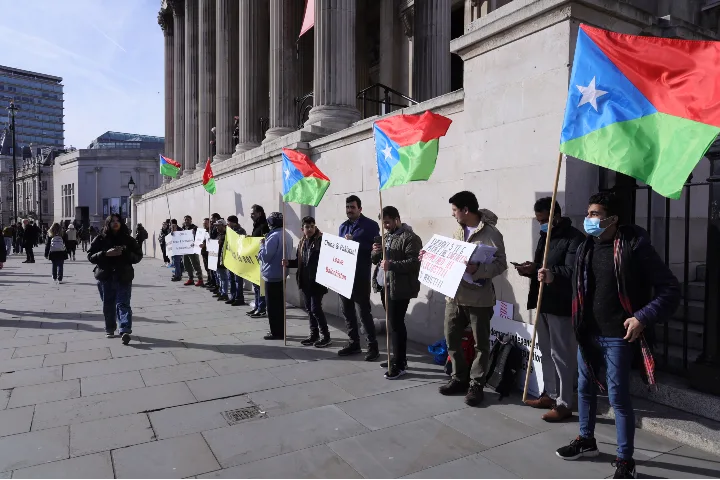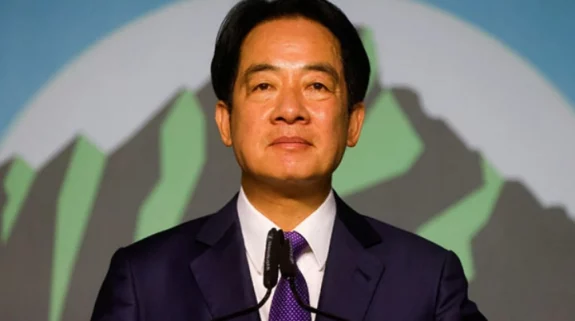Faiz M Baluch is the editor of the online news website Balochwarna and the UK-based treasurer of the Free Balochistan Movement (FBM). On a rare sun-filled British day, India Narrative met up with Faiz for a chat at the Trafalgar Square while he was busy organising a demonstration to highlight the kidnappings of Baloch students by the Pakistani government.
To sustain his family which has migrated to the UK, Faiz works in a logistics company but as the treasurer of the FBM, Faiz fundraises within the community to print leaflets, posters and banners. His work also includes making arrangements for travel and works with other Baloch volunteers to raise awareness abouy human rights atrocities against the impoverished Baloch community which resides in south-west of Pakistan.
The FBM is a Baloch political party which supports independence of Balochistan from both Pakistan and Iran. It has been active in the UK, Germany and other European nations with the support of a miniscule but enthusiastic Baloch diaspora.
Faiz says that he is one of the founding members of the FBM which was launched in 2016. “I was associated with it from the time I was in Saravan, Balochistan, close to the Iran border. Was involved in organising rallies, protests and mobilising people. All of our activities were political and were concentrated on the Goldsmith Line—that divides Balochistan between Pakistan and Iran”.
Read More:
In depth: How Baloch armed organisations are keeping Pakistani army on the tenterhooks
Talking about Baloch families, Faiz adds: “Our families are divided. Kisi ka mamu iss taraf hai, toh chcha uss taraf hai. We are one people across Iran and Pakistan with relations on both sides of the border”.
The FBM activist came to the UK in 2002 as a political refugee and began adapting himself to life and culture in his adopted land. “After I came to this country, I joined the language school and then college. I used to introduce myself as a Baloch and then had to educate people about the basics of Balochistan. I was longing to project the voice of the people of Balochistan. Here we are their voice”.
The Balochs are few in numbers in the UK but are active politically. However, their activism is cautious and is clouded with fear. Faiz says that their relatives back home in Balochistan are in immediate danger and many have been killed. Many are under arrest. “Nearly 20,000 people are in the custody of the Pakistani forces. They will release two people but arrest another five. In February this year, more than 30 students were arrested from Makran, Bolan and even in Punjab”, says Faiz.
Faiz says that Pakistan is giving a “collective punishment to the Baloch” which increases in intensity if an attack takes place on the Pakistani military. He adds that in the rural areas of Balochistan, Pakistan forces will kill children, women and even livestock. Pakistan launched helicopter attacks in Awaran and Kahan in the aftermath of the debilitating January 2022 attacks on Frontier Corps camps by Baloch rebels in which the forces burnt forests and killed animals belonging to the nomadic people of Awaran, says Faiz.
“The Pakistani forces even burnt the Koran belonging to the people. If the Koran is holy, it is for everyone. But in Pakistan, they decide who it is holy for. They decided who will be punished and who will not be punished for burning the Koran”, says Faiz.
Read More:
The Kashmir Files impact: Activist wants Indian film makers to document Baloch struggle
Talking about the harassment of the Baloch students at the hands of the Pakistani security agencies, Faiz highlights another angle. He says that Baloch students are asked questions by their education authorities, but these questions have been sent by the security forces. The students have been threatened not to speak with their relatives settled abroad.
“Everything in Pakistan is controlled by the army. Democracy and the elected government are show pieces to be paraded before the world. The army dictates to the President and the Prime Minister on how to deal with Baloch issues”, says Faiz, adding: “there are two parallel governments running Pakistan—the security forces and the elected government”.
Talking about Iran, Faiz says that the community is not sure of Iran’s support for their cause. “When we were battling Bhutto, we had the upper hand. Then the Shah of Iran sent helicopters and pilots to crush us. I do not think that Iran is supporting the Baloch. I do not see any logic behind this”, says Faiz.
He adds that the Baloch struggle is now getting international attention because of China’s Gwadar port. As the Western countries and China are on opposite sides, the Baloch people and the world have a common interest. We want the UN and US to intervene for our cause like they did in Kosovo and South Sudan. “China is a threat to the world and to the Baloch community because it is exploiting our resources”, says Faiz.
“China is assisting Pakistan in many ways. It is providing technology to Pakistan. We believe that China is assisting Pakistan in tracing the locations of the Baloch fighters. China is complicit in the Baloch genocide. In February, at least ten Baloch fighters were killed in a drone attack in Hoshab, Turbat, in the Makran region. We strongly believe that China assisted Pakistan in the drone attack as it is not that capable”, says Faiz.
Baloch advocacy groups are engaging with members of parliament in the UK and also in Europe to explain the human rights violations in Balochistan. We are asking them to put pressure on Pakistan. Protests help us to connect with the local people and create awareness among them. “We tell the British tax-payers that by supporting the Pakistan government, the UK is indirectly supporting Pakistan’s violations of minorities.




















